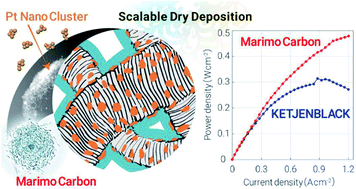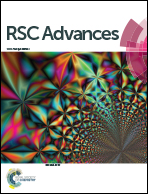Platinum nanocluster catalysts supported on Marimo carbon via scalable dry deposition synthesis†
Abstract
The development of efficient fuel cells greatly promotes reducing the consumption of fossil energy, and it is crucial to enhance the platinum (Pt) catalytic activity by optimizing both the nanoparticle size and support effect. In this study, we generate a smaller and uniform size of naked Pt nanocluster (NC) catalysts via a dry process in the gas phase, and using the direct powder embedded trapping method, the Pt NCs are spatioselectively supported on Marimo carbon (MC) that comprises a high density of carbon nanofilaments. At a minimum Pt loading of 0.05 mgPt cm−2 for both the anode and cathode in a single cell configuration, a membrane-electrode assembly (MEA) formed by the dry-deposition Pt-NC(d)/MC exhibits superior power density (rated) of 0.105 gPt kW−1 at a current density of 1.2 A cm−2, which is better output power density than the conventional MEA formed by Pt catalysts via a wet process. The origin of the improved performance is investigated using transmission electron microscopy; dry-deposition Pt catalysts that are monodispersely loaded on the outer surface of MC can facilitate not only the gas reaction but also leaving the generated water. The present results demonstrate that the dry deposition of Pt NCs on MC can be used as a scalable catalyst synthesis method to reduce the Pt loading.



 Please wait while we load your content...
Please wait while we load your content...